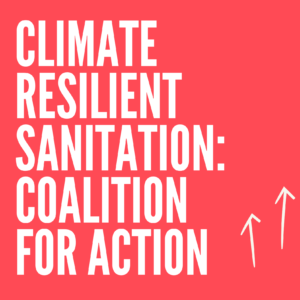Evidence and Action from the Climate Resilient Sanitation Coalition
Target Audience
Sanitation Policy Makers, Practitioners, Climate Change Planners, Urban Planners, Funders, Academics, Researchers, Utilities, Students
Description
Photo credits: Juliet Willetts, Banjarmasin, Indonesia
This webinar cuts across different IWA’s initiatives, programmes and communities. It is being led by the IWA’s Inclusive Urban Sanitation Initiative in collaboration with the Climate Resilient Sanitation coalition.
Climate change is drastically changing the world we live in- and also undermines progress made on achieving universal access to safe sanitation. To address this threat, we need to better articulate the relationship between sanitation and climate change. Climate change damages sanitation service delivery through floods, sea level rise and extreme weather, damaging facilities, grounding service providers and hampering treatment processes. Additionally, poorly managed sanitation systems emit significant amounts of GHGs. Yet, sanitation receives less than 1% of global climate finance.
At COP27, the CRS coalition launched a Call to Action, then developed a CRS technical brief. Now the coalition is working on funding guidance for the Green Climate Fund to increase climate finance for sanitation. This session will summarise latest evidence and action from the CRS coalition to help accelerate CRS implementation globally.
Learning Objectives
At the end of this webinar, participants will be able to:
- Understand of changes in climate (e.g. floods, droughts, sea level rise, warming) are affecting sustainability of sanitation systems and services.
- Understand evidence on GHG emissions from sanitation.
- Describe the impact of these risks to other sectors (e.g., to health, marine ecosystems, emissions).
- Know what can be done to reduce risk as described in the CRS Call to Action.
Additional resources
Q&A report available here
Webinar presentation slides available here
Related Resources:
Host
International Water Association
Panelists
- Kate Medlicott, Sanitation and wastewater team lead, WHO, Switzerland
- Ann Thomas, Senior WASH advisor, UNICEF, USA
- Nat Paynter, CRS coalition coordinator, UNICEF, USA
- Amelia Wenger, Water Pollution Program Lead, Wildlife Conservation Society, Australia
- Daniel Ddiba, Research Fellow, Stockholm Environment Institute, Sweden
- Jose Gesti, Senior Water and Climate Consultant, Sanitation and Water for All, Spain
- Meera Mehta, Professor Emeritus, Center for Water and Sanitation (CWAS), CRDF, CEPT University, India
- Sanyu Lutalo Senior Water Supply and Sanitation Specialist, World Bank, USA
- Juliet Willetts Professor Institute for Sustainable Futures, UTS, Australia
